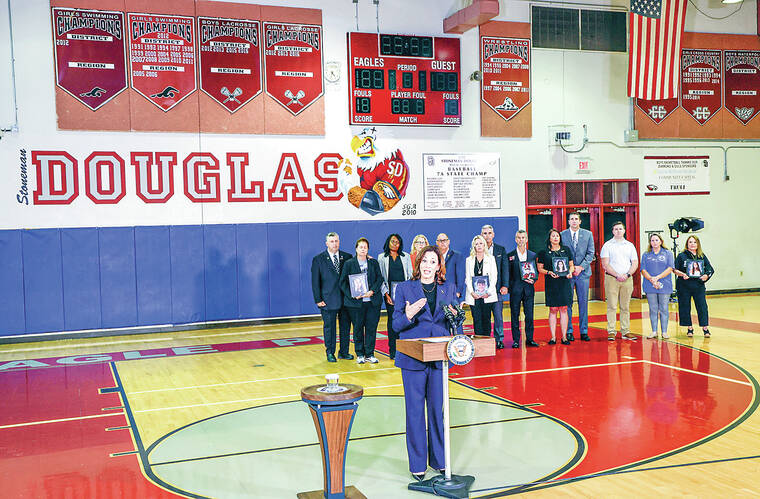‘Frozen in time.’ Kamala Harris tours bloodstained building where 2018 Parkland massacre happened
PARKLAND, Fla. — Vice President Kamala Harris toured on Saturday the bloodstained classroom building where the 2018 Parkland high school massacre happened, then announced a program to assist states that have laws allowing police to temporarily seize guns from people judges have found to be dangerous.
Harris saw bullet-pocked walls and floors still covered in dried blood and broken glass left behind from the Feb. 14, 2018, attack at Marjory Stoneman Douglas High School that killed 14 students and three staff members and wounded 17.
ADVERTISING
The halls and classrooms inside the three-story structure remain strewn with shoes left behind by fleeing students and wilted Valentine’s Day flowers and balloons. Textbooks, laptop computers, snacks and papers remain on desks. She was told about each victim who died.
“Frozen in time,” Harris said repeatedly about what she saw. She was accompanied on the tour by victims’ family members, some of them pushing for more spending on school safety and others for stronger gun laws.
Harris, who leads the new White House Office of Gun Violence Prevention, said there are lessons to be learned from Parkland, both for stopping school shootings before they happen and mitigating them with measures such as making sure classroom doors don’t lock from the outside as they did at Stoneman Douglas. She pointed out that shootings are a leading cause of death for children and teenagers.
“We must be willing to have the courage to say that on every level, whether you talk about changing laws or changing practices and protocols, that we must do better,” Harris said.
At Stoneman Douglas, former student Nikolas Cruz, then 19, fired about 140 shots from his AR-15-style semiautomatic rifle during his six-minute attack, moving methodically from the first floor, through the second and onto the third.
He pleaded guilty in 2021.
He was sentenced to life in prison in 2022 after his jury couldn’t unanimously agree he deserved a death sentence, angering the victims’ families.
The building was preserved so his jury could tour it. It has loomed over the 3,600-student school from behind a temporary fence since the school reopened two weeks after the shooting. It is scheduled to be demolished this summer. No replacement plan has been announced.
Following Harris’ tour, she announced a $750 million grant program to provide technical assistance and training to Florida and the other 20 states that have similar “red flag laws.”
Florida’s law allows police officers, with a judge’s permission, to temporarily seize guns belonging to anyone shown to be a danger to others or themselves. The statute has been used more than 12,000 times since it was enacted six years ago in response to the Parkland shooting.
Harris also called on both Congress and states without red flag laws to adopt them. The Biden administration has called for a national red flag law.
Cruz had a long history of troubling and bizarre behavior before the shooting, including animal torture. In the weeks before the shooting, he had been reported to local law enforcement and the FBI by people fearing he was planning a mass shooting, but no action was taken.
He legally purchased 10 guns in the 17 months between his 18th birthday and the massacre.
“Red flag laws are simply designed to give communities a vehicle through which they can share … information about the concern of potential danger or the crying out for help,” Harris said.
Sen. Rick Scott, a Republican who signed Florida’s red flag law as governor, issued a statement Saturday calling the Biden administration’s proposed national red flag law “radical,” saying it would be modeled on California’s statute and strip gun owners of their rights. California’s law is broader than Florida’s as it allows family members, employers and others to initiate the process, but the removal also has to be approved by a judge.
California’s law “abandons due process to more quickly and easily take constitutional rights away from law-abiding Americans. That is unacceptable,” Scott said.
Harris’ tour was the latest by elected officials and law enforcement and education leaders in recent months. Education Secretary Miguel Cardona toured it in January, and several members of Congress, mostly Democrats, have gone through since law enforcement returned custody of the building to the school district last summer.





